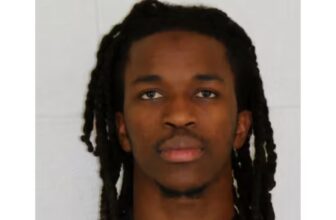Sign in
William Consovoy, a lawyer who became a go-to counsel for conservative causes, spearheading ongoing efforts to reshape voting laws and dismantle affirmative action and also representing President Donald Trump in legal wrangling over the release of his tax returns, died Jan. 9 at his home in Falls Church, Va. He was 48.
He was diagnosed in 2020 with glioblastoma, an aggressive form of brain cancer, said his mother, Linda Whalen. Mr. Consovoy was a key lawyer in lawsuits challenging race-conscious admissions policies at Harvard University and the University of North Carolina that are currently awaiting decision by the U.S. Supreme Court. He was unable to participate in the oral arguments in those cases in October because of his failing health.
Even among his legal and philosophical adversaries, Mr. Consovoy was recognized as a formidable legal intellect, one whose influence was belied by his young age.
“He was insightful, he was intelligent, he was knowledgeable, and, most importantly, he was courageous,” Edward Blum, a conservative activist who worked with Mr. Consovoy to undo elements of the 1965 Voting Rights Act and on a series of affirmative-action lawsuits, said in an interview. “He took cases that the vast majority of lawyers and law firms in this country would not take.”
Mr. Consovoy stood out among the many Ivy Leaguers who populate the federal judiciary on both sides of the bench. He had aspired to work in sports management before enrolling at what is now the Antonin Scalia Law School at George Mason University, which he said he decided to attend mainly because its location in Northern Virginia allowed him to save money by living with relatives.
“Many lawyers in D.C. have this kind of upper-class affect, and Will is not one of those,” William Baude, a law professor at the University of Chicago and a friend of Mr. Consovoy’s, told The Washington Post in 2019. “You can tell he’s still sort of the scrappy guy from New Jersey who doesn’t care about the pomp and circumstance.”
In the course of his legal studies, Mr. Consovoy found purpose in the law and particularly in conservative jurisprudence. Supreme Court Justice Clarence Thomas, whom Mr. Consovoy described as his “hero,” later hired him as a clerk.
Mr. Consovoy spent the early years of his career as a partner with the Washington law firm of Wiley Rein. He was “deeply involved,” Blum said, “in the planning and the execution” of Shelby County v. Holder. In that case, decided in 2013, the Supreme Court voted 5-4 to invalidate a central provision of the Voting Rights Act, which subjected states and localities with a record of racial discrimination to seek federal “preclearance” before making changes to the ways citizens vote.
To those who agreed with the court, the decision represented a necessary update to a federal law nearly half a century after it was passed. To those who disagreed, it was a calamitous blow to protections of civil rights when they remained imperiled. Mr. Consovoy, in remarks quoted by the New York Times, characterized the ruling as a “modest decision by the court.”
In 2014, Mr. Consovoy helped form the boutique firm that is now Consovoy McCarthy. The following year, he argued two cases before the U.S. Supreme Court — Spokeo, Inc. v. Robins, a case that was “not famous to the public but of great practical importance to litigators on ‘standing,’” legal commentator David Lat wrote in a tribute to Mr. Consovoy, and the other, Evenwel v. Abbott, on electoral reapportionment.
But he became perhaps best known for his representation of Students for Fair Admissions, a group organized by Blum to challenge affirmative action in the college application process. (Mr. Consovoy was already at work with Blum on Fisher v. University of Texas, in which the Supreme Court in 2016 ultimately upheld race-conscious admissions.)
In 2014, Blum’s group filed federal lawsuits against Harvard and UNC, alleging that race-conscious admissions amounted to racial discrimination that harmed Asian American applicants in particular.
“If the court … asks itself, ‘Can we be confident that Harvard is not discriminating against Asian American applicants in the way the Supreme Court asks us to be confident if we’re going to allow universities to use racial preferences,’ I believe the answer would be a resounding ‘no,’” Mr. Consovoy said in arguments before an appeals court in 2020, according to the National Law Journal.
The Supreme Court is widely expected to rule against Harvard and UNC. Such a decision would be hailed by opponents of affirmative action as a victory for what they regard as fairness and decried by supporters of race-conscious admissions as a strike against diversity and entrenched institutional bias. A ruling against the universities, Lat wrote, “could end up being Consovoy’s most enduring legal legacy.”
Mr. Consovoy also attracted attention as a personal lawyer to Trump during his long-running battle to prevent congressional Democrats and New York prosecutors from obtaining his tax and other financial records amid investigations into potential conflicts of interest and foreign influence-peddling.
“We view the entire subpoena as an inappropriate fishing expedition not made in good faith,” Mr. Consovoy told an appeals court panel in 2019, also arguing that Trump was protected by “temporary presidential immunity.”
Referring to Trump’s campaign boast that he could “stand in the middle of Fifth Avenue and shoot somebody” and not “lose any voters,” a judge asked if Mr. Consovoy was arguing that even under those circumstances the president could not be investigated while in office.
“That is correct,” Mr. Consovoy responded, while noting that “of course, Congress retains the impeachment power.”
In an email after Mr. Consovoy’s death, Douglas N. Letter, a lawyer who served as general counsel of the U.S. House of Representatives during the chamber’s battles with Trump, recalled that he and Mr. Consovoy “squared off against each other in court on various occasions.”
“Will was an extremely skilled litigator,” Letter wrote, “and I knew that I always had to bring my ‘A game’ when he was on the other side.”
William Spencer Consovoy was born in Plainfield, N.J., on Aug. 31, 1974.
His father, Andrew, was chairman of the New Jersey State Parole Board before resigning amid allegations, which he denied, that he traded favors with members of the mob. He faced no charges, and his son described the episode to the Times as “a painful experience for me and for my family.”
Mr. Consovoy’s mother worked with the state violent crimes compensation board before leading a day-treatment program for adults with severe mental illness.
In 1996, Mr. Consovoy received a bachelor’s degree in political science from Monmouth University in West Long Branch, N.J. At Scalia Law School, where he graduated in 2001, he studied presidential power under Kenneth Starr, the former U.S. solicitor general and independent counsel who investigated President Bill Clinton in the matter of his affair with former White House intern Monica S. Lewinsky.
In 2020 Mr. Consovoy married Masa Anisic. She died the following year of colon cancer.
Besides his mother, of Scotch Plains, N.J., survivors include his father, of Centreville, Va.; his stepfather, Bernie Whalen of Scotch Plains; and a sister.
Despite his stature in the conservative legal word, Mr. Consovoy kept a strategically low profile. “I do not talk to the media,” he was said to have remarked. “I talk to the court.”





